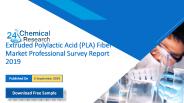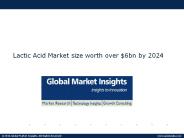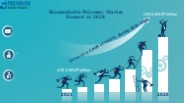Polylactic Acid Pla Market PowerPoint PPT Presentations
All Time
Recommended
Polylactic Acid (PLA) is thermoplastic polyester derived from renewable feedstock such as corn starch, sugarcane, wheat, tapioca roots. PLA has wide application such as in Packaging, Textile, Agriculture, Transportation, Bio-Medical and Electronics industry. Due to environmental concerns and scarcity & volatility of prices of fossil fuels, many companies and government regulatory bodies are focusing to find substitute to oil-based products. See Full Report @ http://bit.ly/1rkNx7d
| PowerPoint PPT presentation | free to download
The global lactic acid market is projected to reach USD 3.82 Billion by 2020, growing at a CAGR of 18.6% & the global polylactic acid market is projected to reach USD 5.16 Billion by 2020, growing at a CAGR of 20.9% during the forecast period.
| PowerPoint PPT presentation | free to download
Detailed report at: http://www.reportsandintelligence.com/polylactic-acid-market Polylactic Acid (PLA) is thermoplastic polyester derived from renewable feedstock such as corn starch, sugarcane, wheat and tapioca roots. PLA products contain bio-based renewable constituents.
| PowerPoint PPT presentation | free to download
Bio-polylactic Acid (PLA) Films Market size is forecast to reach $736.2 million by 2026, after growing at a CAGR of 14.1% during 2021-2026.
| PowerPoint PPT presentation | free to download
Download free PDF Sample: https://bit.ly/3e8JMPr #PolylacticAcid #MarketAnalysis Polylactic acid (PLA) is an aliphatic polyester made up of lactic acid (2-hydroxy propionic acid) building blocks. It is also a biodegradable and compostable thermoplastic derived from renewable plant sources, such as starch and sugar.
| PowerPoint PPT presentation | free to download
Download free PDF Sample: https://bit.ly/30vm9wD #BioPolylacticAcid #MarketAnalysis Bio-Polylactic Acid (PLA) market is segmented by Type, and by Application. Players, stakeholders, and other participants in the global Bio-Polylactic Acid (PLA) market will be able to gain the upper hand as they use the report as a powerful resource.
| PowerPoint PPT presentation | free to download
The global Extruded Polylactic Acid (PLA) Fiber market is valued at US$ xx million in 2020 is expected to reach US$ xx million by the.
| PowerPoint PPT presentation | free to download
Download Free Research Report PDF @ http://bit.ly/2kgGEel #ExtrudedPolylacticAcidFiber #MarketAnalysis Extruded Polylactic Acid (PLA) Fiber report focuses on its volume and value at global level, regional level and company level. From a global perspective, this report represents overall Extruded Polylactic Acid (PLA) Fiber market size by analyzing historical data and future prospect.Extruded PLA is used in various end-user industries as a substitute for polyester and nylon.The global Extruded PLA market is expected to grow majorly driven by the usage of bio-based materials that are expected to help the environment by reducing the greenhouse gas emissions from the usage of crude oil and the need to use sustainable plastic materials. Full Report Url - http://bit.ly/2lFkGBO
| PowerPoint PPT presentation | free to download
Download Free Research Report PDF: http://bit.ly/2RCUhmk #ExtrudedPolylacticAcidFiberMarket #MarketAnalysis Extruded PLA is used in various end-user industries as a substitute for polyester and nylon. Full Report Url: http://bit.ly/2EfGJFz
| PowerPoint PPT presentation | free to download
Download free PDF Sample: https://bit.ly/3cmOFn2 #BiopolylacticAcidFilms #MarketAnalysis Global Bio-polylactic Acid (PLA) Films Market Size by Type and by Application, 2019-2021, and 2020 (quarterly data), (US$ Million) & (K MT) Global Bio-polylactic Acid (PLA) Films Market Size by Region (and Key Countries), 2019-2021, and 2020.
| PowerPoint PPT presentation | free to download
Polylactic Acid Market @ Big Market Research offers Global Polylactic Acid (PLA) Market Size, Share, Forecast, Analysis, Report, Research, and Trends 2015-2019. This analysts forecast the Global PLA market to grow at a CAGR of 19.97 percent over the period 2014-2019. PLA is a lactic acid-based polymer and is biodegradable in nature. It is made from raw materials including corn, wheat, sugar cane, dextrose, lactic acid, and others. Basic raw materials are fermented to produce lactic acid, which is the key agent for developing PLA.
| PowerPoint PPT presentation | free to download
Free Research Report PDF : https://bityl.co/3NdP Bio-polylactic Acid (PLA) Films market is segmented by Type, and by Application. Players, stakeholders, and other participants in the global Bio-polylactic Acid (PLA) Films market will be able to gain the upper hand as they use the report as a powerful resource. Download Free Research Report PDF : https://bityl.co/3NdQ
| PowerPoint PPT presentation | free to download
Download Free Research Report PDF: http://bit.ly/33ZyJU8 #PrintingMarket #MarketAnalysis Global Polylactic Acid (PLA) For 3D Printing market size will increase to xx Million US$ by 2025, from xx Million US$ in 2018, at a CAGR of xx% during the forecast period. Full Report Url :http://bit.ly/2QySA90
| PowerPoint PPT presentation | free to download
Download Free Research Report PDF : https://bit.ly/3irnBGt Extruded Polylactic Acid (PLA) Fiber market is segmented by Type, and by Application. Players, stakeholders, and other participants in the global Extruded Polylactic Acid (PLA) Fiber market will be able to gain the upper hand as they use the report as a powerful resource. Free Research Report PDF: https://bit.ly/33Pyo9z
| PowerPoint PPT presentation | free to download
[100 Pages Global Polylactic Acid Market Report] by Applications (Packaging, Agriculture, Automobile, Catering, 3D Printing) Size, Growth, Trends, and Forecast 2014-2020
| PowerPoint PPT presentation | free to download
Free Research Report PDF : https://bityl.co/3IVi Polylactic Acid (PLA) market is segmented by region, by country, company, type, application and by sales channels. Players, stakeholders, and other participants in the global Polylactic Acid (PLA) market will be able to gain the upper hand as they use the report as a powerful resource. Download Free Research Report PDF : https://bityl.co/3IVj
| PowerPoint PPT presentation | free to download
[300 Pages Report] Poly Lactic Acid (PLA) Market and Lactic Acid Market Research Report categorizes the global market for PLA and lactic acid on the basis of applications, raw materials, and geography; forecasting volumes, revenues, and analyzing trends.-A PDF document.
| PowerPoint PPT presentation | free to download
"Global Lactic Acid and Polylactic Acid Market" a new research report has announced by Adroit Market Research to its database.
| PowerPoint PPT presentation | free to download
Biopolymer coatings are used as barrier coatings on many packaging materials to avoid unwanted moisture transfer in food products. These are excellent oil and oxygen barrier materials that can be replace paperboard and synthetic paper coatings. Biopolymer coatings are integrated with antimicrobial agents to provide efficient packing materials for protecting food from microorganism infiltration.
| PowerPoint PPT presentation | free to download
[300 Pages Report] Poly Lactic Acid (PLA) Market and Lactic Acid Market Rresearch Report categorizes the global market for PLA and lactic acid on the basis of applications, raw materials, and geography; forecasting volumes, revenues, and analyzing trends.
| PowerPoint PPT presentation | free to download
The increasing demand for polylactic acid (PLA) in the packaging sector is one of the significant factors influencing the market growth.
| PowerPoint PPT presentation | free to download
BSE 4514: Industrial Processing Fermentation Lactic acid is made from fermentation of sugar with the sugar source usually being starch because it is cheap and high ...
| PowerPoint PPT presentation | free to view
The increasing demand for polylactic acid (PLA) in the packaging sector is one of the significant factors influencing the market growth.
| PowerPoint PPT presentation | free to download
The bio-polylactic acid market size is forecast to reach US$1.4 billion by 2027, after growing at a CAGR of 14.5% during the forecast period (2022-2027).
| PowerPoint PPT presentation | free to download
Calendered Polylactic acid is a biodegradable polymer extracted from lactic acid. Polylactic acid has many or more properties than many petroleum plastics and is suitable for a variety of applications. PLA is resistant to moisture and grease.
| PowerPoint PPT presentation | free to download
The Global Polylactic Acid Market is estimated to grow at a CAGR of 14.55% during the forecasting years of 2019-2027. Read More.
| PowerPoint PPT presentation | free to download
Global polylactic acid market is estimated to grow at a CAGR of 11.44% and is expected to reach $2120.78 million over the forecast period of 2019 to 2028. Read More
| PowerPoint PPT presentation | free to download
To Get sample Brochure now@ http://tinyurl.com/jtbv97t A detailed qualitative analysis of the factors responsible for driving and restraining growth of the World Polylactic Acid Market and future opportunities are provided in the report.
| PowerPoint PPT presentation | free to download
Research Nester’s recent market research analysis on “Polyglycolic Acid Market: Global Demand Analysis & Opportunity Outlook 2035”
| PowerPoint PPT presentation | free to download
Polylactic acid: increasing demand from automotive as well as consumer goods projected to boost the growth of the global market
| PowerPoint PPT presentation | free to download
PLA is a lactic acid-based polymer and is biodegradable in nature. It is made from raw materials including corn, wheat, sugar cane, dextrose, lactic acid, and others. Basic raw materials are fermented to produce lactic acid, which is the key agent for developing PLA. The unique properties such as rigidity and transparency, and features similar to PET makes the material a potential substitute to petroleum-based plastics. The applications of PLA are mainly in the following industries: Biodegradable Polymers, Food and Beverages, Medical and Pharmaceuticals, and Personal Care. Get full report & TOC @: http://www.researchbeam.com/global-polylactic-acid-pla-2015-2019-market
| PowerPoint PPT presentation | free to download
As per Inkwood Research, the Global Polylactic Acid (PLA) Market is predicted to progress with a CAGR of 18.26% in terms of revenue during the forecast period of 2024-2032.
| PowerPoint PPT presentation | free to download
Lactic Acid Market size is estimated to reach $1.4 billion by 2027, growing at a CAGR of 8.3% during the forecast period 2022-2027.
| PowerPoint PPT presentation | free to download
Download free PDF Sample: http://bit.ly/39feFjG #Polylactic #MarketAnalysis the market size of Polylactic is 560 million US$ and it will reach 1390 million US$ in 2025, growing at a CAGR of 12.1% from 2019
| PowerPoint PPT presentation | free to download
Polylactic Acid (PLA) Market size generated over USD 1 billion business in 2015 and expects gains at over 16.5%.
| PowerPoint PPT presentation | free to download
According to the latest research report by IMARC Group, The Japan lactic acid market size is projected to exhibit a growth rate (CAGR) of 3.80% during 2024-2032. More Info:- https://www.imarcgroup.com/japan-lactic-acid-market
| PowerPoint PPT presentation | free to download
In this report, the global Poly Lactic Acid market is valued at USD XX million in 2016 and is expected to reach USD XX million by the end of 2022, growing at a CAGR of XX% between 2016 and 2022.
| PowerPoint PPT presentation | free to download
The global lactic acid market is expected to exhibit a CAGR of 10.07% during 2022-2027. More info: https://www.imarcgroup.com/lactic-acid-market
| PowerPoint PPT presentation | free to download
[100 Pages Published Report] Global Cloud Computing Market Service (Software, Infrastructure, Platform) Size, Global Trends, Opportunities, Segmentation and Forecast 2014-2020
| PowerPoint PPT presentation | free to download
The report on "Global Superabsorbent Polymers (SAP) Market Research Report 2014-2021" added by DecisionDatabases.com gives an in depth industry analysis of the market. It covers the costing, sales, revenue details and forecasts.
| PowerPoint PPT presentation | free to download
Biodegradable plastics are the type of bioplastics that can be decomposed by micro-organisms. They can be derived either from renewable polymers such as starch, starch blends and polylactic acid (PLA), or from petroleum feedstock such as polycaprolactone (PCL) and polybutyrate. Based on the source material, biodegradable plastics are classified as biobased and fossil based biodegradable plastics. See full Report – http://bit.ly/1u7pKvV
| PowerPoint PPT presentation | free to download
Get more information @ http://bit.ly/2pYWI0R Lactic acid market share in industrial application should witness gain at above 12%. It finds application in biodegradable polymers and lactate solvents production.
| PowerPoint PPT presentation | free to download
Form-Fill-Seal (FFS) Films Market: Flourishing Packaged Food Sector Points to Profitable Opportunities: Global Industry Analysis 2014-2018 and Opportunity Assessment 2019-2029
| PowerPoint PPT presentation | free to download
Biodegradable mulch films are used in mulching technique, where these films are used to shield the soil surface around crops to produce best conditions for the growth of crops. These films are eco-friendly, useful in controlled agriculture on restricted arable land, with restricted irrigation. These films help enhancing crop quality and improving agricultural productivity with offering nutrients, lessening soil erosion, increasing soil temperature, & defeating the weeds growth. These are organic mulching materials resulting from plants and animals. With its beneficial use & unique characteristics, it is expected that biodegradable mulch film market will grow over the forecasted period.
| PowerPoint PPT presentation | free to download
Biodegradable mulch films are used in mulching technique, where these films are used to shield the soil surface around crops to produce best conditions for the growth of crops. These films are eco-friendly, useful in controlled agriculture on restricted arable land, with restricted irrigation. These films help enhancing crop quality and improving agricultural productivity with offering nutrients, lessening soil erosion, increasing soil temperature, & defeating the weeds growth. These are organic mulching materials resulting from plants and animals. With its beneficial use & unique characteristics, it is expected that biodegradable mulch film market will grow over the forecasted period.
| PowerPoint PPT presentation | free to download
Bioresorbable Polymers Market Forecast To 2028 - COVID-19 Impact And Global Analysis By Type (Polylactic Acid (PLA), Polyglycolic Acid (PGA), Polydioxanone, Polycaprolactone (PCL), And Others) And Application (Orthopedic Devices, Drug Delivery, And Others)
| PowerPoint PPT presentation | free to download
Global biodegradable paper and plastic packaging market size is expected to reach $19.24 Bn by 2028 at a rate of 10.2%, segmented as by type, starch based plastic, cellulose based plastic, polylactic acid (pla), polyhydroxyalkanoates (pha)
| PowerPoint PPT presentation | free to download
Global biodegradable plastics market size is expected to reach $12.88 Bn by 2028 at a rate of 17.2%, segmented as by type, polylactic acid (pla), polybutylene adipate terephthalate (pbat), polybutylene succinate (pbs), pha (polyhydroxyalkanoates)
| PowerPoint PPT presentation | free to download
Global biodegradable films market size is expected to reach $1.79 Bn by 2028 at a rate of 7.1%, segmented as by type, polylactic acid (pla), starch blends, biodegradable polyesters, polyhydroxyalkanoates (pha), other types
| PowerPoint PPT presentation | free to download
Global plastic alternative packaging market size is expected to reach $11.84 Bn by 2028 at a rate of 17.3%, segmented as by type, starch-based plastic, cellulose based plastics, polylactic acid (pla), polyhydroxyalkanoates (pha), other types
| PowerPoint PPT presentation | free to download
Global Plastic Alternative Packaging Market by The Business Research Company is segmented as Starch Based Plastic, Cellulose Based Plastics, Polylactic Acid (PLA), Polyhydroxyalkanoates (PHA), Recyclable, Reusable, Biodegradable
| PowerPoint PPT presentation | free to download
Polylactic Acid (PLA) Market Analysis: Plant Capacity, Production, Operating Efficiency, Demand & Supply, End Use, Distribution Channel, Region, Competition, Trade, Customer & Price Intelligence Market Analysis, 2015-2035, The Polylactic Acid (PLA) market is expected to witness considerable growth by reaching 1560 thousand tonnes in 2035, at a healthy CAGR of 14.50% in the span of the next ten years.
Global Polylactic Acid (PLA) Market 2015-2019 has been prepared based on an in-depth market analysis with inputs from industry experts. The report covers the Americas, the APAC region, Europe, and the ROW; it also covers the Global PLA market landscape and its growth prospects in the coming years. Read the Complete Report @ http://www.reportsnreports.com/reports/344951-global-polylactic-acid-pla-market-2015-2019.html .
Global Plastic Alternative Packaging Market by The Business Research Company is segmented as Starch Based Plastic, Cellulose Based Plastics, Polylactic Acid (PLA), Polyhydroxyalkanoates (PHA), Recyclable, Reusable, Biodegradable.
| PowerPoint PPT presentation | free to download
This report, Global Polylactic Acid Market 2017-2021, has been prepared based on an in-depth market analysis with inputs from industry experts.
To Get More Details @ http://www.bigmarketresearch.com/global-bioplastics-2014-2018-market “Big Market Research : Global Bioplastics Market- Size, Share, Trends, Analysis, Research, Report and Forecast, 2014-2018” Bioplastics are a type a biodegradable plastic derived from renewable sources such as vegetable oil, potatoes, rice, tapioca, pea starch, corn starch, wheat and other grains, sugar cane, and cellulose from wood strands. They are also known as organic plastics because they are derived from sustainable sources. There are different types of bioplastics: polymers that are directly extracted from biomass and processed; polymers that are made of bio-based precursors (polylactic acid or PLA); and polymers by bacteria (PHA and PHBs).
| PowerPoint PPT presentation | free to download
























































